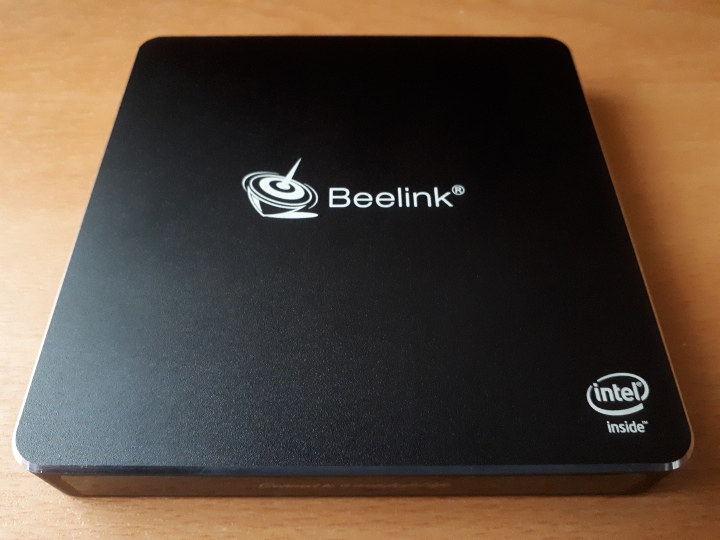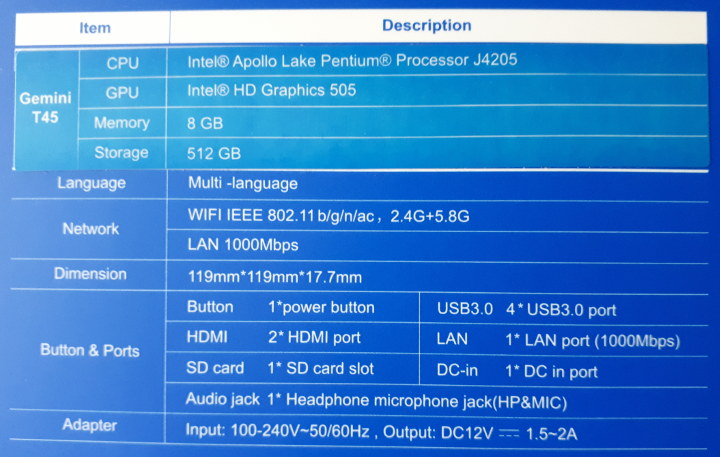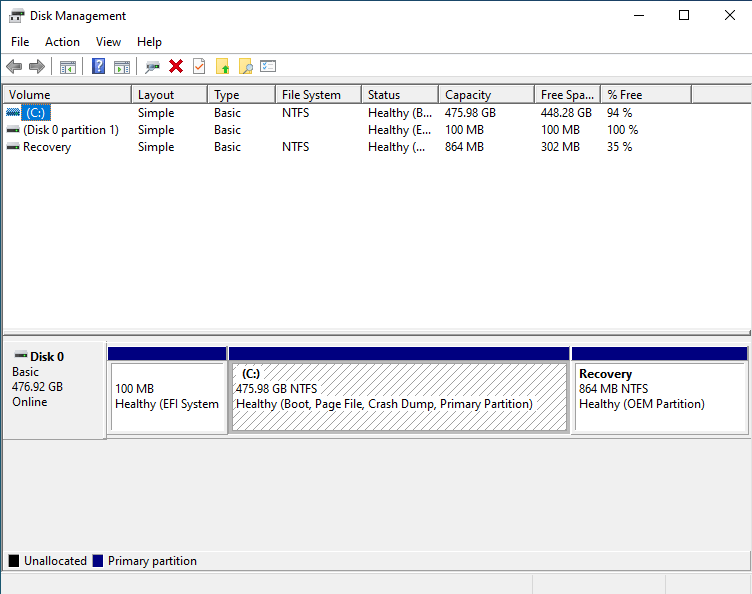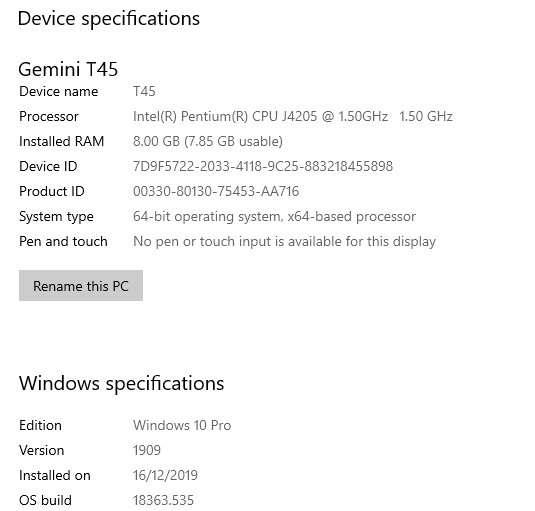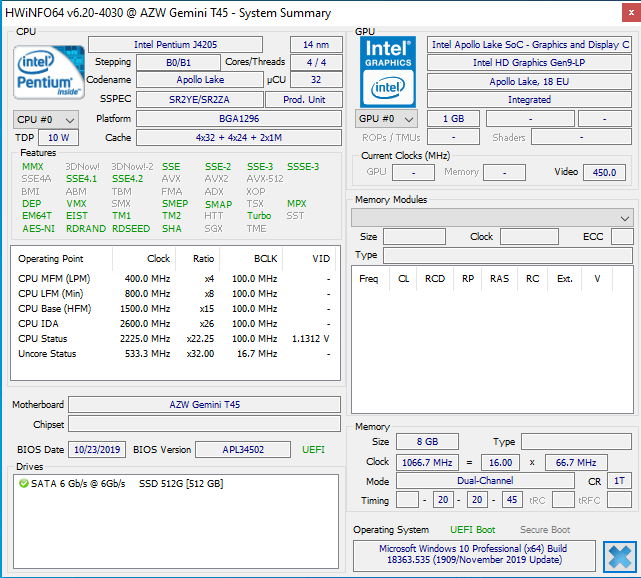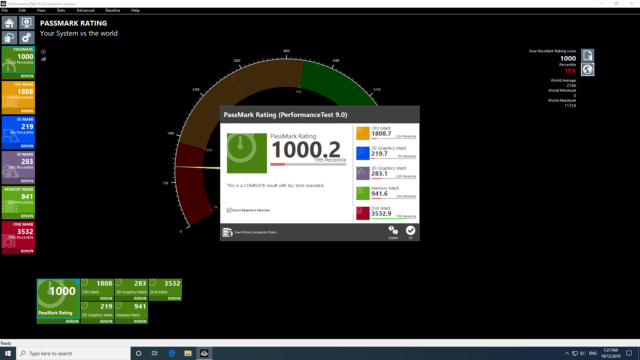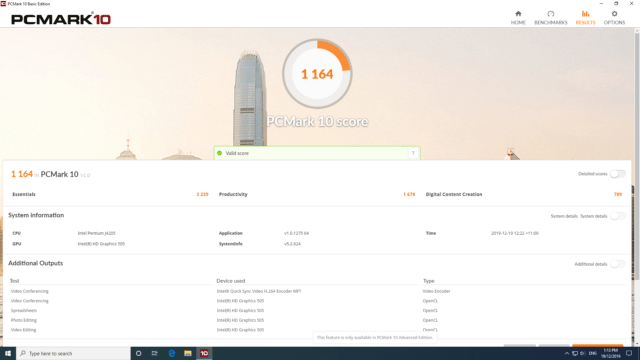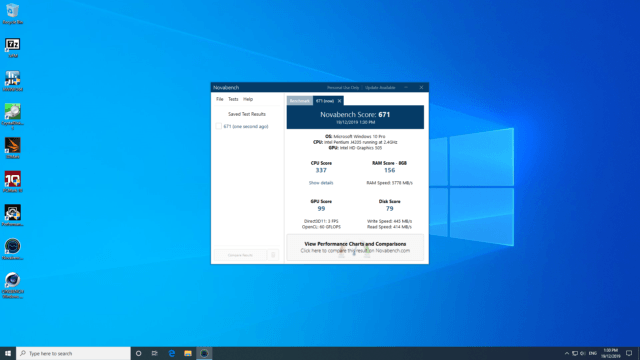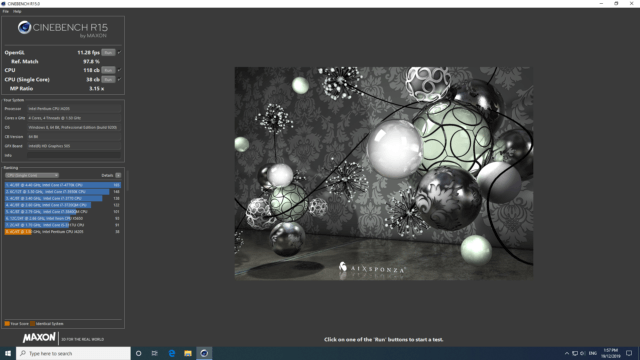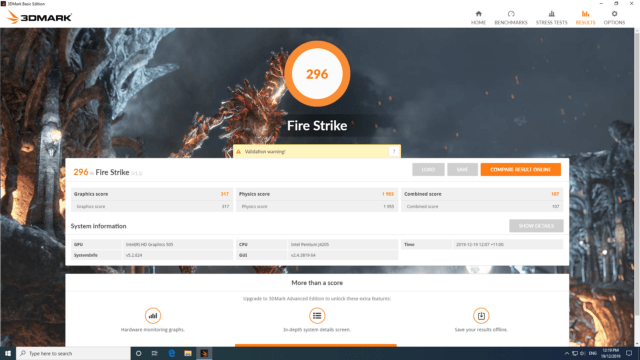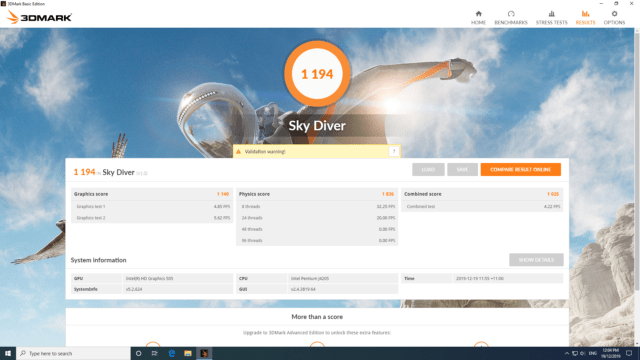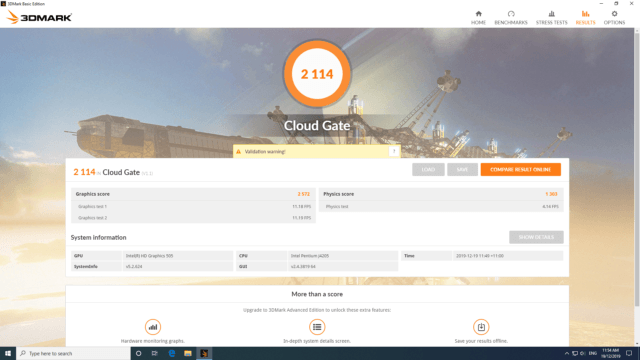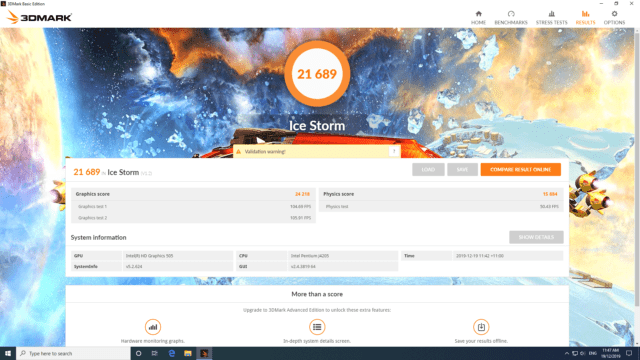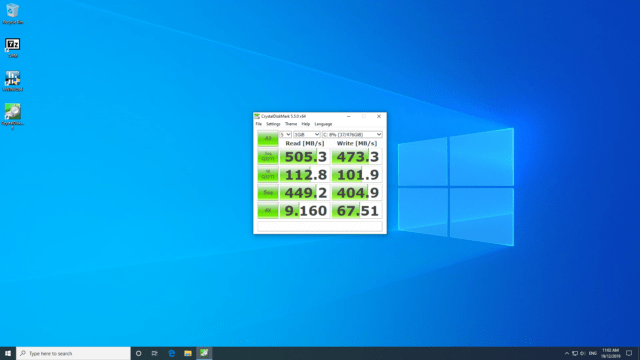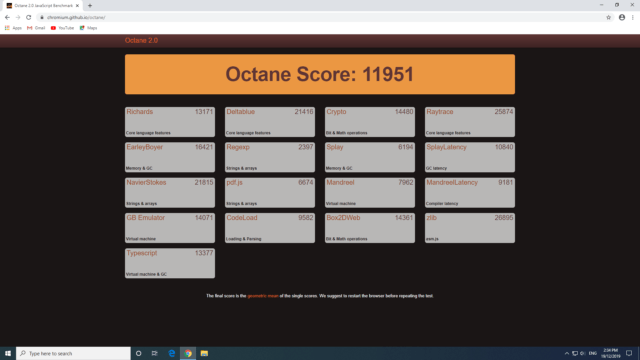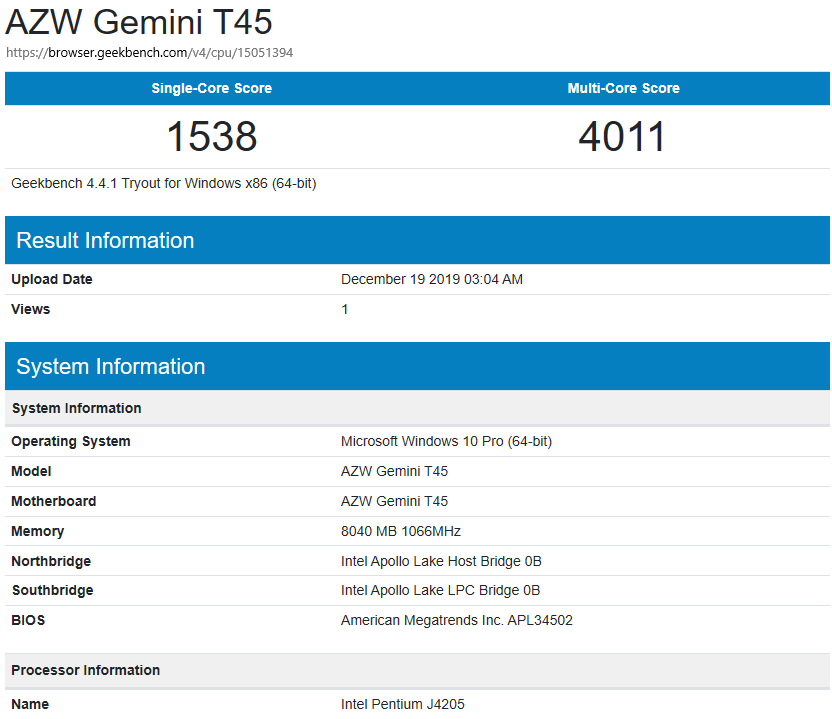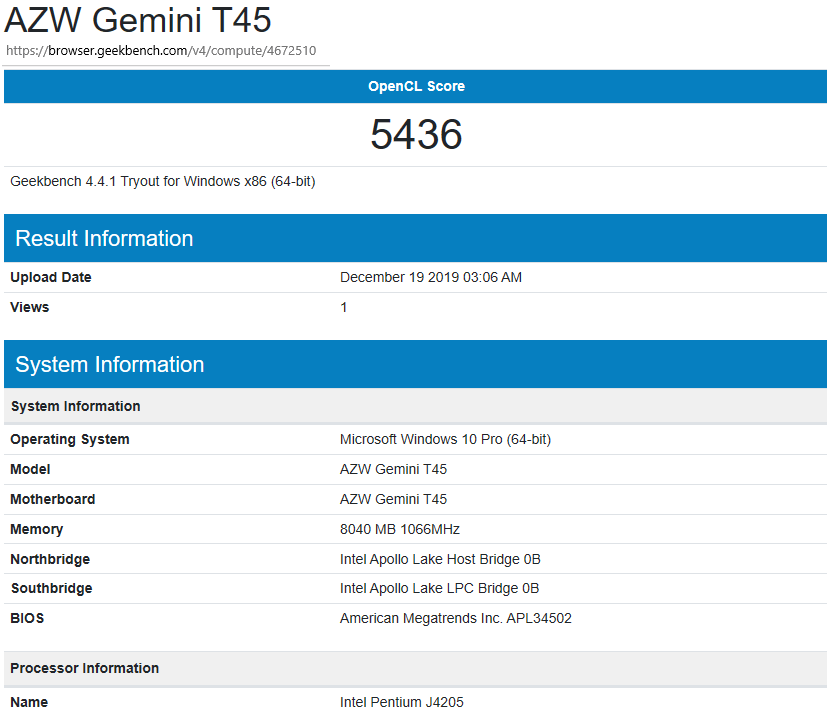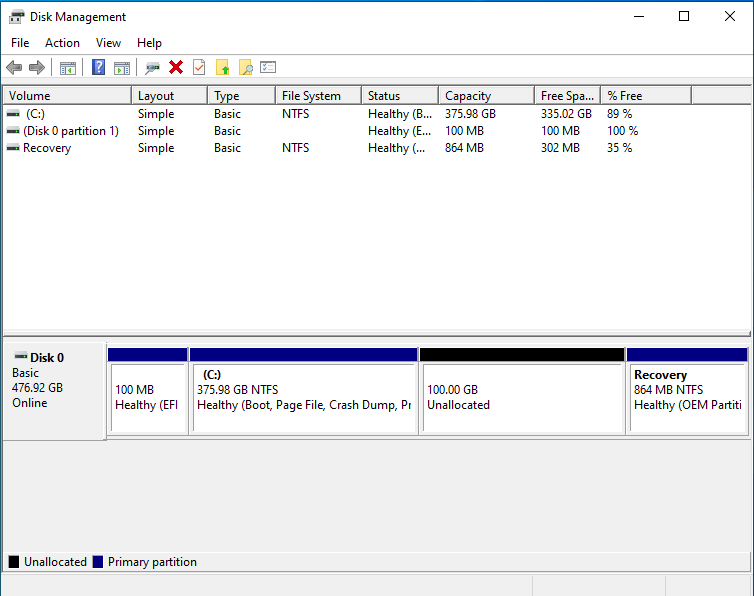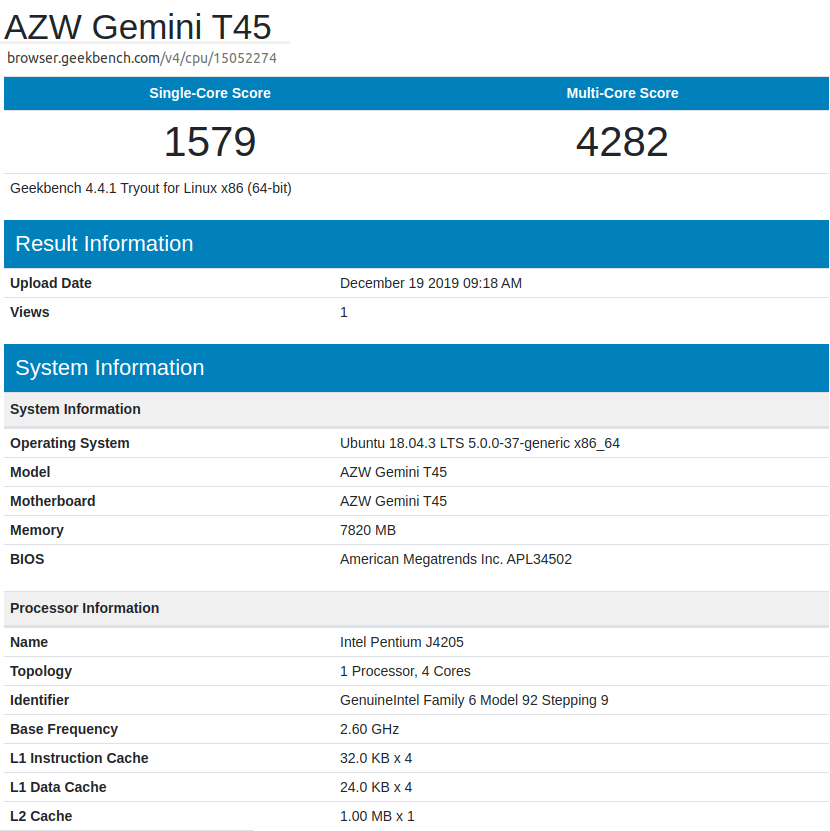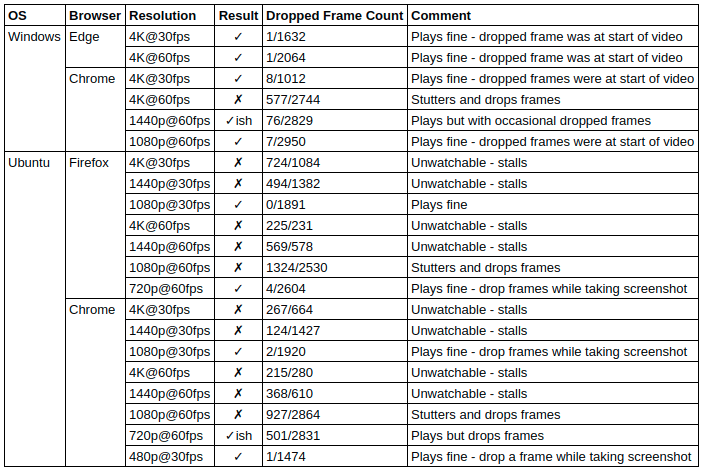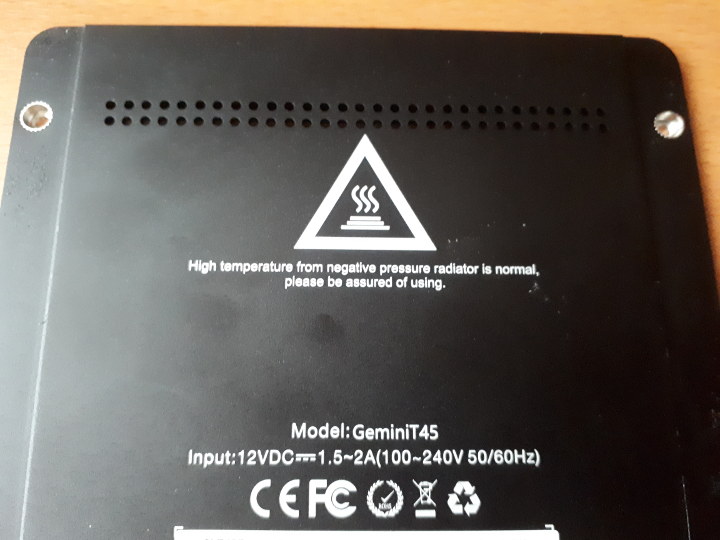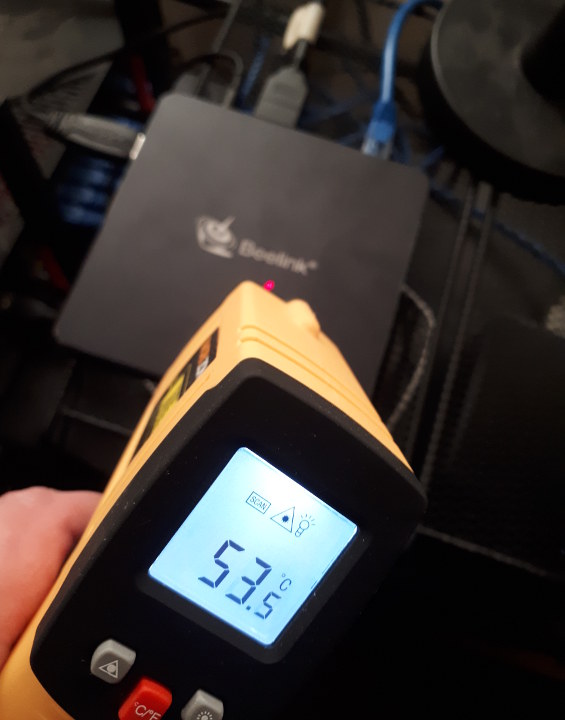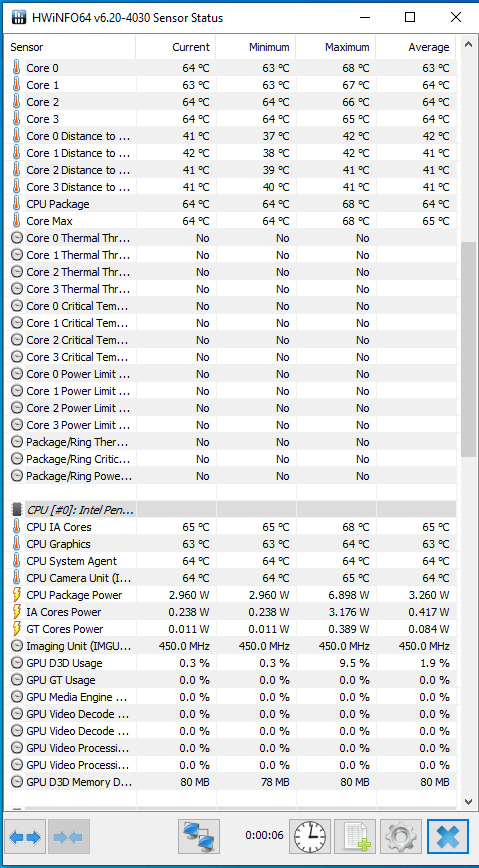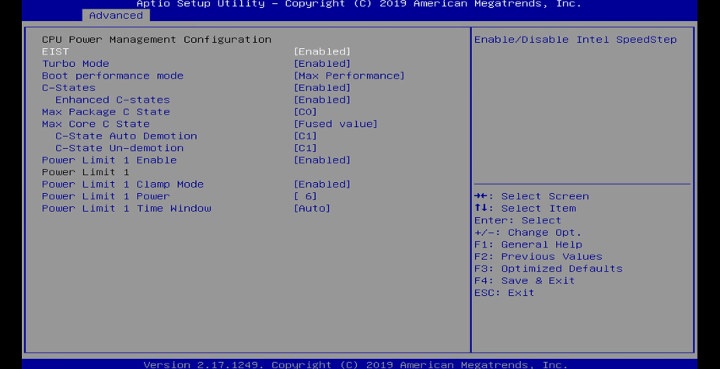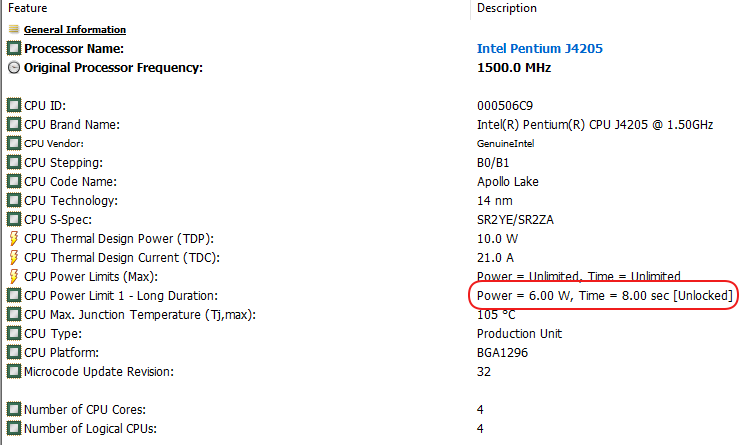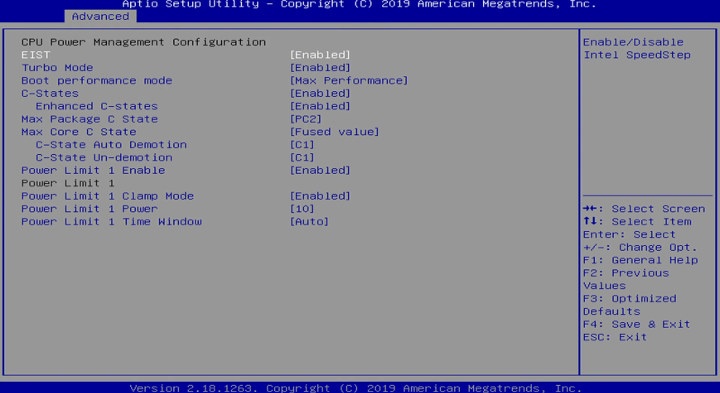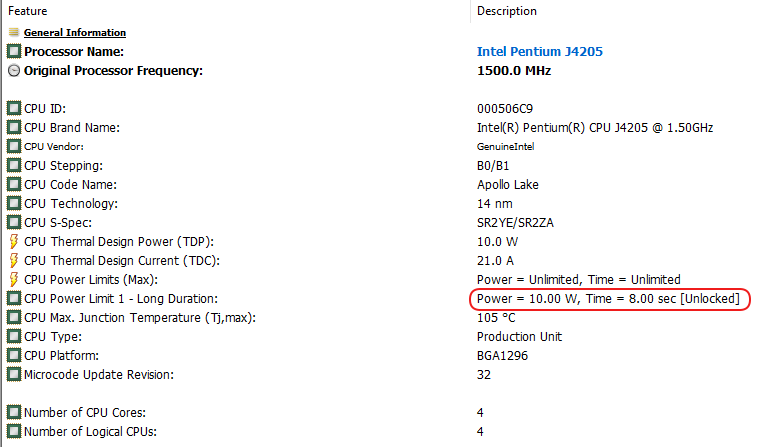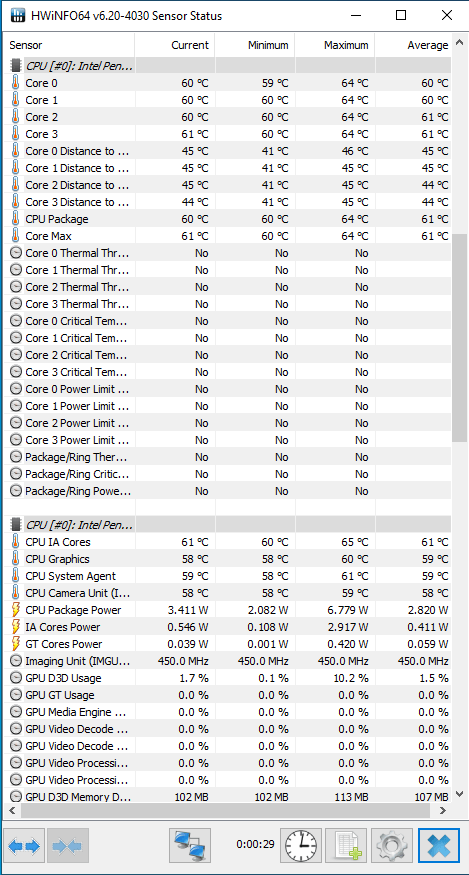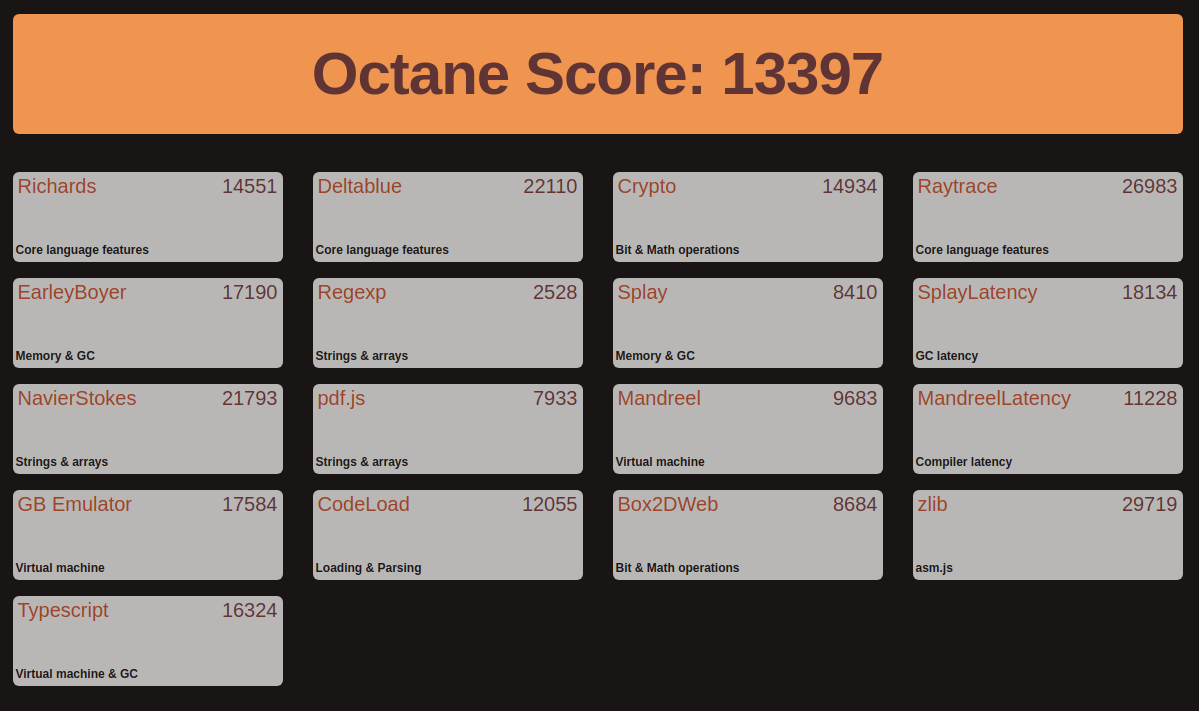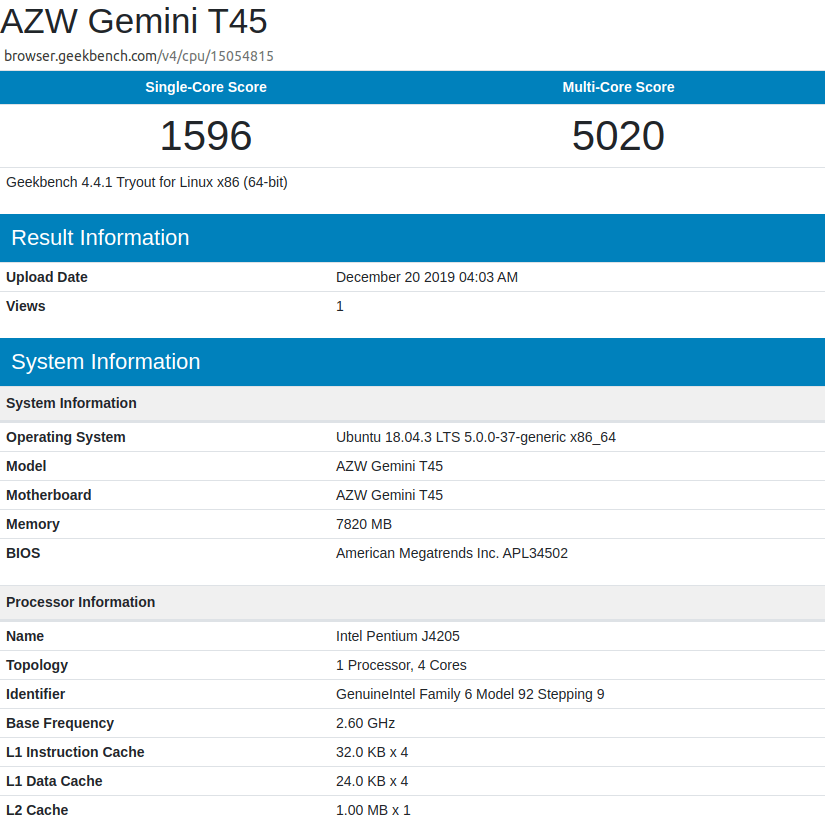[Update December 23, 2019: We’ve been informed by Beelink that the T45 has been updated to the 6W Celeron N4200 processor instead, and the system is now cooled with a fan. The model reviewed in this post is the fanless version with a 10W Intel J4250 processor, which was never sold]
[Update January 30, 2020: We’ve now posted a review of the new model at Beelink Gemini T45 Pentium N4200 Mini PC Review]
Beelink have further extended their ‘Gemini’ range of mini PCs by adding the T45. This is a passively cooled mini PC that is effectively a companion to the J45 as it again uses the slightly older Apollo Lake Intel Pentium J4205 CPU which is a quad-core 4-thread 1.50 GHz processor boosting to 2.60 GHz with Intel’s HD Graphics 505.
Although the T45 is a ‘NUC’ style mini PC physically consisting of a 119 x 119 x 17.7 mm (4.69 x 4.69 x 0.70 inches) all-metal (and surprisingly quite heavy) rectangular case, it is just under half the thickness of the J45 and is very similar in size to the earlier AP34 and AP42 models from Beelink. The front panel has only a blue ‘power’ LED as it is the rear panel that includes the power button, power jack, dual HDMI ports, a gigabit Ethernet port, and a headphone jack. On the right side there are a couple of USB 3.0 ports and on the left side are a couple more USB 3.0 ports and a full-sized SD slot.
The full specifications include:
The T45 comes with a 2242 M.2 SSD (512GB in this reviewed device) with pre-installed Windows 10 Home (version 1903 OS build 18362.356) together with 8GB of soldered DDR3 RAM.
In the box you get a mounting bracket with screws for attaching the device to behind a monitor together with a couple of HDMI cables, a power adapter (not in shown the photo below), a manual and a service card:
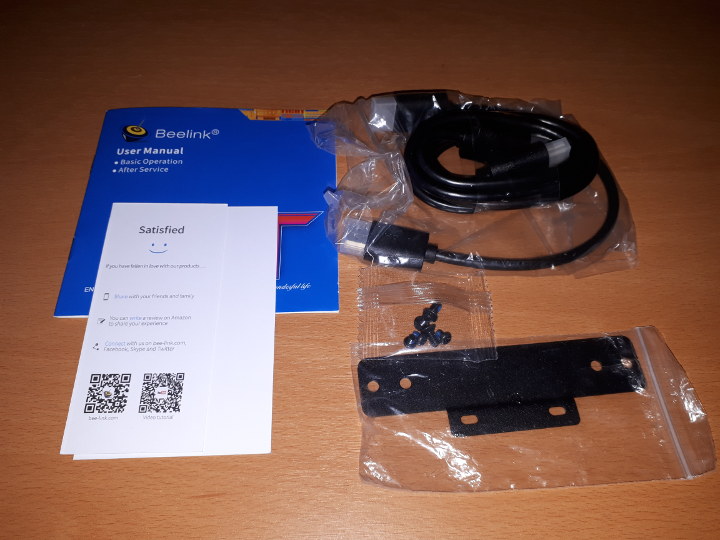
Starting with a quick look at the hardware information shows it is aligned to the specification:
After fully updating Windows to version 1909 OS build 18363.535 I ran my standard set of benchmarking tools to look at performance under Windows:
and to compare with other Intel mini PCs:
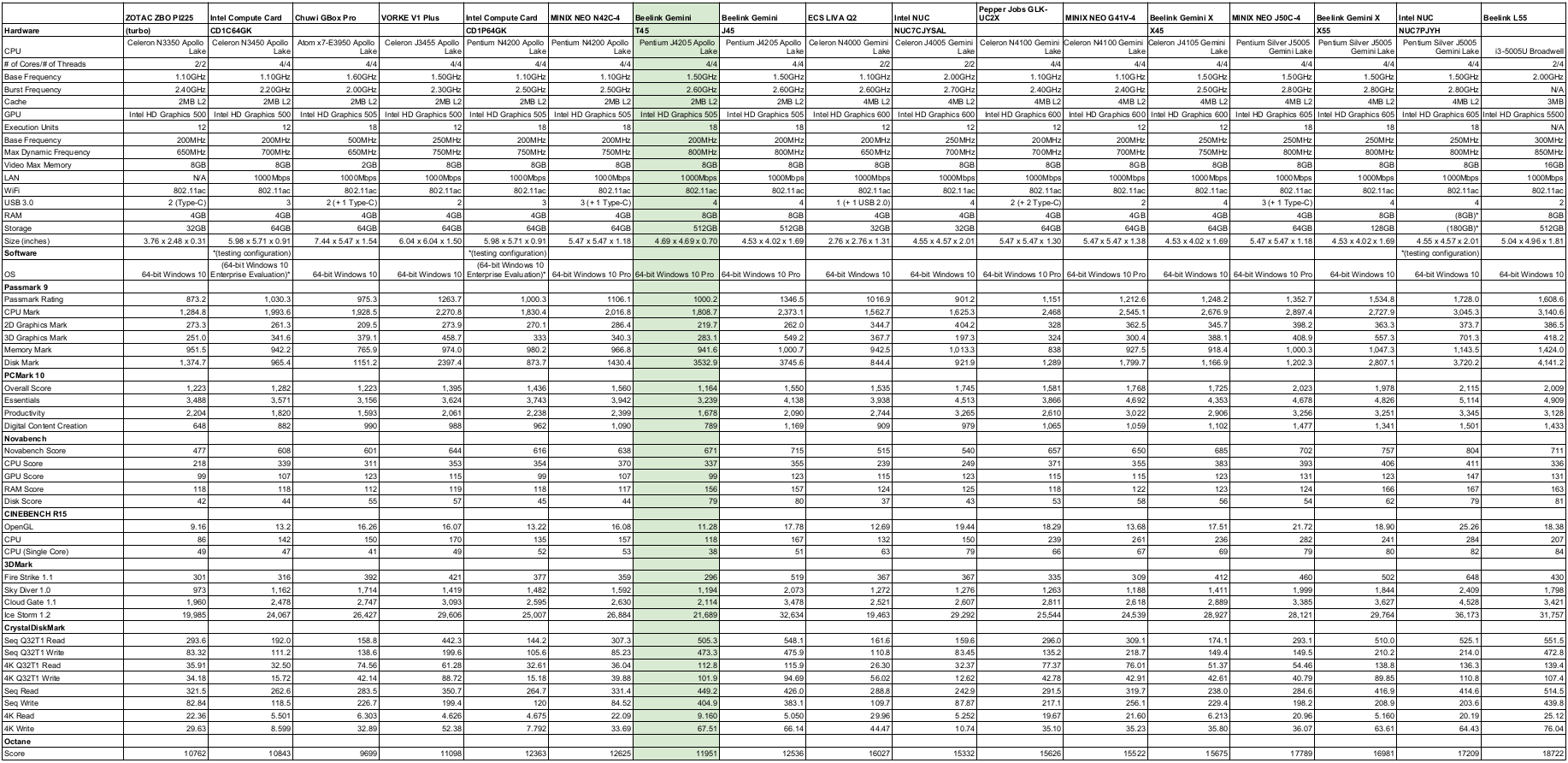
The results need interpreting carefully otherwise they could be misleading because mini PC benchmarks are heavily influenced by the quantity and type of memory and storage installed.
However, when comparing the T45 with the similarly spec’d J45 the results are significantly lower and are more inline with a Celeron N3350/N3450 processor.
Additionally, I also tested with Geekbench 4 and got a single-core score of 1538, a multi-core score of 4011 and an OpenGL score of 5436:
Next, I shrunk the Windows partition and created a new 100GB partition so I could install and dual boot Ubuntu using an Ubuntu 18.04.3 ISO:
After installation and updates, a brief check showed everything working including Wi-Fi, Bluetooth, audio, and Ethernet. I then ran some basic commands to look at the hardware in more detail:
|
1 2 3 4 5 6 7 8 9 10 11 12 13 14 15 16 17 18 19 20 21 22 23 24 25 26 27 28 29 30 31 32 33 34 35 36 37 38 39 40 41 42 43 44 45 46 47 48 49 50 51 52 53 54 55 56 57 58 59 60 61 62 63 64 65 66 67 68 69 70 71 72 73 74 75 76 77 78 79 80 81 82 83 84 85 86 87 88 89 90 91 92 93 94 95 96 97 98 99 100 101 102 103 104 105 106 107 108 109 110 111 112 113 114 115 116 117 118 119 120 121 122 123 124 125 126 127 128 129 130 131 132 133 134 135 136 137 138 139 140 141 142 143 144 145 146 147 148 149 150 151 152 153 154 155 156 157 158 159 160 161 162 163 164 165 166 167 168 169 170 171 172 173 174 175 176 177 178 179 180 181 182 183 184 185 186 187 188 189 190 191 192 193 194 195 196 197 198 199 200 201 202 203 204 205 206 207 208 209 210 211 212 213 214 215 216 217 218 219 220 221 222 |
linuxium@T45:~$ lsb_release -a Distributor ID: Ubuntu Description: Ubuntu 18.04.3 LTS Release: 18.04 Codename: bionic linuxium@T45:~$ linuxium@T45:~$ uname -a Linux T45 5.0.0-37-generic #40~18.04.1-Ubuntu SMP Thu Nov 14 12:06:39 UTC 2019 x86_64 x86_64 x86_64 GNU/Linux linuxium@T45:~$ linuxium@T45:~$ inxi -Fc0 System: Host: T45 Kernel: 5.0.0-37-generic x86_64 bits: 64 Console: tty 0 Distro: Ubuntu 18.04.3 LTS Machine: Device: desktop System: AZW product: Gemini T45 serial: N/A Mobo: AZW model: Gemini T45 serial: N/A UEFI: American Megatrends v: APL34502 date: 10/23/2019 Battery hidpp__0: charge: N/A condition: NA/NA Wh hidpp__1: charge: N/A condition: NA/NA Wh CPU: Quad core Intel Pentium J4205 (-MCP-) cache: 1024 KB clock speeds: max: 2600 MHz 1: 2566 MHz 2: 2422 MHz 3: 2419 MHz 4: 2487 MHz Graphics: Card: Intel Celeron N3350/Pentium N4200/Atom E3900 Series Integrated Graphics Controller Display Server: X.Org 1.20.4 driver: i915 Resolution: 1920x1080@60.00hz OpenGL: renderer: Mesa DRI Intel HD Graphics 505 (Broxton) version: 4.5 Mesa 19.0.8 Audio: Card Intel Celeron N3350/Pentium N4200/Atom E3900 Series Audio Cluster driver: snd_hda_intel Sound: Advanced Linux Sound Architecture v: k5.0.0-37-generic Network: Card-1: Realtek RTL8111/8168/8411 PCI Express Gigabit Ethernet Controller driver: r8169 IF: enp1s0 state: up speed: 1000 Mbps duplex: full mac: 84:39:be:9c:06:d8 Card-2: Intel Wireless 3165 driver: iwlwifi IF: wlp2s0 state: down mac: 94:e6:f7:9c:3c:3b Drives: HDD Total Size: 512.1GB (1.9% used) ID-1: /dev/sda model: SSD_512G size: 512.1GB Partition: ID-1: / size: 98G used: 9.2G (10%) fs: ext4 dev: /dev/sda5 RAID: No RAID devices: /proc/mdstat, md_mod kernel module present Sensors: System Temperatures: cpu: 58.0C mobo: N/A Fan Speeds (in rpm): cpu: N/A Info: Processes: 253 Uptime: 46 min Memory: 1470.5/7820.0MB Client: Shell (review-tests.sh) inxi: 2.3.56 linuxium@T45:~$ linuxium@T45:~$ df -h Filesystem Size Used Avail Use% Mounted on udev 3.8G 0 3.8G 0% /dev tmpfs 783M 1.9M 781M 1% /run /dev/sda5 98G 9.2G 84G 10% / tmpfs 3.9G 0 3.9G 0% /dev/shm tmpfs 5.0M 4.0K 5.0M 1% /run/lock tmpfs 3.9G 0 3.9G 0% /sys/fs/cgroup /dev/sda1 96M 75M 22M 78% /boot/efi tmpfs 782M 20K 782M 1% /run/user/121 tmpfs 782M 56K 782M 1% /run/user/1000 /dev/loop0 89M 89M 0 100% /snap/core/7270 /dev/loop1 55M 55M 0 100% /snap/core18/1066 /dev/loop2 43M 43M 0 100% /snap/gtk-common-themes/1313 /dev/loop3 150M 150M 0 100% /snap/gnome-3-28-1804/67 /dev/loop4 4.2M 4.2M 0 100% /snap/gnome-calculator/406 /dev/loop5 15M 15M 0 100% /snap/gnome-characters/296 /dev/loop6 1.0M 1.0M 0 100% /snap/gnome-logs/61 /dev/loop7 3.8M 3.8M 0 100% /snap/gnome-system-monitor/100 tmpfs 782M 0 782M 0% /run/user/0 linuxium@T45:~$ linuxium@T45:~$ lsblk -a NAME MAJ:MIN RM SIZE RO TYPE MOUNTPOINT loop0 7:0 0 88.5M 1 loop /snap/core/7270 loop1 7:1 0 54.4M 1 loop /snap/core18/1066 loop2 7:2 0 42.8M 1 loop /snap/gtk-common-themes/1313 loop3 7:3 0 149.9M 1 loop /snap/gnome-3-28-1804/67 loop4 7:4 0 4M 1 loop /snap/gnome-calculator/406 loop5 7:5 0 14.8M 1 loop /snap/gnome-characters/296 loop6 7:6 0 1008K 1 loop /snap/gnome-logs/61 loop7 7:7 0 3.7M 1 loop /snap/gnome-system-monitor/100 sda 8:0 0 477G 0 disk ├─sda1 8:1 0 100M 0 part /boot/efi ├─sda2 8:2 0 16M 0 part ├─sda3 8:3 0 376G 0 part ├─sda4 8:4 0 864M 0 part └─sda5 8:5 0 100G 0 part / linuxium@T45:~$ linuxium@T45:~$ sudo lshw -C cpu *-cpu description: CPU product: Intel(R) Pentium(R) CPU J4205 @ 1.50GHz vendor: Intel Corp. physical id: 38 bus info: cpu@0 version: Intel(R) Pentium(R) CPU J4205 @ 1.50GHz slot: SOCKET 0 size: 2424MHz capacity: 2600MHz width: 64 bits clock: 100MHz capabilities: x86-64 fpu fpu_exception wp vme de pse tsc msr pae mce cx8 apic sep mtrr pge mca cmov pat pse36 clflush dts acpi mmx fxsr sse sse2 ss ht tm pbe syscall nx pdpe1gb rdtscp constant_tsc art arch_perfmon pebs bts rep_good nopl xtopology tsc_reliable nonstop_tsc cpuid aperfmperf tsc_known_freq pni pclmulqdq dtes64 monitor ds_cpl vmx est tm2 ssse3 sdbg cx16 xtpr pdcm sse4_1 sse4_2 x2apic movbe popcnt tsc_deadline_timer aes xsave rdrand lahf_lm 3dnowprefetch cpuid_fault cat_l2 ibrs ibpb stibp tpr_shadow vnmi flexpriority ept vpid ept_ad fsgsbase tsc_adjust smep erms mpx rdt_a rdseed smap clflushopt intel_pt sha_ni xsaveopt xsavec xgetbv1 xsaves dtherm ida arat pln pts md_clear arch_capabilities cpufreq configuration: cores=4 enabledcores=4 threads=4 linuxium@T45:~$ linuxium@T45:~$ sudo lshw -C memory *-firmware description: BIOS vendor: American Megatrends Inc. physical id: 0 version: APL34502 date: 10/23/2019 size: 64KiB capacity: 5056KiB capabilities: pci upgrade shadowing cdboot bootselect socketedrom edd int13floppy1200 int13floppy720 int13floppy2880 int5printscreen int9keyboard int14serial int17printer acpi usb biosbootspecification uefi *-memory description: System Memory physical id: 30 slot: System board or motherboard size: 8GiB *-bank:0 description: DIMM DDR3 Synchronous product: 123456789012345678 vendor: ABCD physical id: 0 serial: 1234 slot: ChannelA-DIMM0 size: 2GiB width: 16 bits *-bank:1 description: DIMM DDR3 Synchronous product: 123456789012345678 vendor: ABCD physical id: 1 serial: 1234 slot: ChannelB-DIMM0 size: 2GiB width: 16 bits *-bank:2 description: DIMM DDR3 Synchronous product: 123456789012345678 vendor: ABCD physical id: 2 serial: 1234 slot: ChannelC-DIMM0 size: 2GiB width: 16 bits *-bank:3 description: DIMM DDR3 Synchronous product: 123456789012345678 vendor: ABCD physical id: 3 serial: 1234 slot: ChannelD-DIMM0 size: 2GiB width: 16 bits *-cache:0 description: L1 cache physical id: 36 slot: CPU Internal L1 size: 224KiB capacity: 224KiB capabilities: synchronous internal write-back configuration: level=1 *-cache:1 description: L2 cache physical id: 37 slot: CPU Internal L2 size: 2MiB capacity: 2MiB capabilities: synchronous internal write-back unified configuration: level=2 linuxium@T45:~$ linuxium@T45:~$ free -mh total used free shared buff/cache available Mem: 7.6G 1.2G 1.4G 277M 5.1G 5.9G Swap: 2.0G 256K 2.0G linuxium@T45:~$ linuxium@T45:~$ sudo lshw -C network *-network description: Ethernet interface product: RTL8111/8168/8411 PCI Express Gigabit Ethernet Controller vendor: Realtek Semiconductor Co., Ltd. physical id: 0 bus info: pci@0000:01:00.0 logical name: enp1s0 version: 0c serial: 84:39:be:9c:06:d8 size: 1Gbit/s capacity: 1Gbit/s width: 64 bits clock: 33MHz capabilities: pm msi pciexpress msix vpd bus_master cap_list ethernet physical tp mii 10bt 10bt-fd 100bt 100bt-fd 1000bt-fd autonegotiation configuration: autonegotiation=on broadcast=yes driver=r8169 duplex=full firmware=rtl8168g-2_0.0.1 02/06/13 ip=xxx.xxx.xxx.xxx latency=0 link=yes multicast=yes port=MII speed=1Gbit/s resources: irq:22 ioport:e000(size=256) memory:91204000-91204fff memory:91200000-91203fff *-network description: Wireless interface product: Wireless 3165 vendor: Intel Corporation physical id: 0 bus info: pci@0000:02:00.0 logical name: wlp2s0 version: 81 serial: 94:e6:f7:9c:3c:3b width: 64 bits clock: 33MHz capabilities: pm msi pciexpress bus_master cap_list ethernet physical wireless configuration: broadcast=yes driver=iwlwifi driverversion=5.0.0-37-generic firmware=29.1044073957.0 latency=0 link=no multicast=yes wireless=IEEE 802.11 resources: irq:129 memory:91100000-91101fff linuxium@T45:~$ linuxium@T45:~$ dmesg | grep "MMC card" linuxium@T45:~$ linuxium@T45:~$ lsusb Bus 002 Device 001: ID 1d6b:0003 Linux Foundation 3.0 root hub Bus 001 Device 005: ID 8087:0a2a Intel Corp. Bus 001 Device 003: ID 0bda:0129 Realtek Semiconductor Corp. RTS5129 Card Reader Controller Bus 001 Device 006: ID 046d:c52b Logitech, Inc. Unifying Receiver Bus 001 Device 004: ID 10d5:55a4 Uni Class Technology Co., Ltd Bus 001 Device 002: ID 1a40:0101 Terminus Technology Inc. Hub Bus 001 Device 001: ID 1d6b:0002 Linux Foundation 2.0 root hub linuxium@T45:~$ linuxium@T45:~$ lspci -nn 00:00.0 Host bridge [0600]: Intel Corporation Celeron N3350/Pentium N4200/Atom E3900 Series Host Bridge [8086:5af0] (rev 0b) 00:02.0 VGA compatible controller [0300]: Intel Corporation Celeron N3350/Pentium N4200/Atom E3900 Series Integrated Graphics Controller [8086:5a84] (rev 0b) 00:0e.0 Audio device [0403]: Intel Corporation Celeron N3350/Pentium N4200/Atom E3900 Series Audio Cluster [8086:5a98] (rev 0b) 00:0f.0 Communication controller [0780]: Intel Corporation Celeron N3350/Pentium N4200/Atom E3900 Series Trusted Execution Engine [8086:5a9a] (rev 0b) 00:12.0 SATA controller [0106]: Intel Corporation Celeron N3350/Pentium N4200/Atom E3900 Series SATA AHCI Controller [8086:5ae3] (rev 0b) 00:13.0 PCI bridge [0604]: Intel Corporation Celeron N3350/Pentium N4200/Atom E3900 Series PCI Express Port A #1 [8086:5ad8] (rev fb) 00:13.1 PCI bridge [0604]: Intel Corporation Celeron N3350/Pentium N4200/Atom E3900 Series PCI Express Port A #2 [8086:5ad9] (rev fb) 00:13.2 PCI bridge [0604]: Intel Corporation Celeron N3350/Pentium N4200/Atom E3900 Series PCI Express Port A #3 [8086:5ada] (rev fb) 00:13.3 PCI bridge [0604]: Intel Corporation Celeron N3350/Pentium N4200/Atom E3900 Series PCI Express Port A #4 [8086:5adb] (rev fb) 00:15.0 USB controller [0c03]: Intel Corporation Celeron N3350/Pentium N4200/Atom E3900 Series USB xHCI [8086:5aa8] (rev 0b) 00:1b.0 SD Host controller [0805]: Intel Corporation Celeron N3350/Pentium N4200/Atom E3900 Series SDXC/MMC Host Controller [8086:5aca] (rev 0b) 00:1c.0 SD Host controller [0805]: Intel Corporation Celeron N3350/Pentium N4200/Atom E3900 Series eMMC Controller [8086:5acc] (rev 0b) 00:1f.0 ISA bridge [0601]: Intel Corporation Celeron N3350/Pentium N4200/Atom E3900 Series Low Pin Count Interface [8086:5ae8] (rev 0b) 00:1f.1 SMBus [0c05]: Intel Corporation Celeron N3350/Pentium N4200/Atom E3900 Series SMBus Controller [8086:5ad4] (rev 0b) 01:00.0 Ethernet controller [0200]: Realtek Semiconductor Co., Ltd. RTL8111/8168/8411 PCI Express Gigabit Ethernet Controller [10ec:8168] (rev 0c) 02:00.0 Network controller [0280]: Intel Corporation Wireless 3165 [8086:3165] (rev 81) linuxium@T45:~$ |
Interestingly the Ethernet driver is similar to the J45 in that the T45 uses the default r8169 module. However, it uses a different ‘mac version’ with the ‘rtl8168g-2_0.0.1’ firmware and therefore does not have the same problems as the J45 and works as expected.
I next ran my standard Phoronix Test Suite benchmarks and the results can be compared with those from the previous testing on other mini PCs:


As the full results might be a little confusing because for some tests, higher is better, whereas for others, lower is better, the following bar chart may be easier to understand:
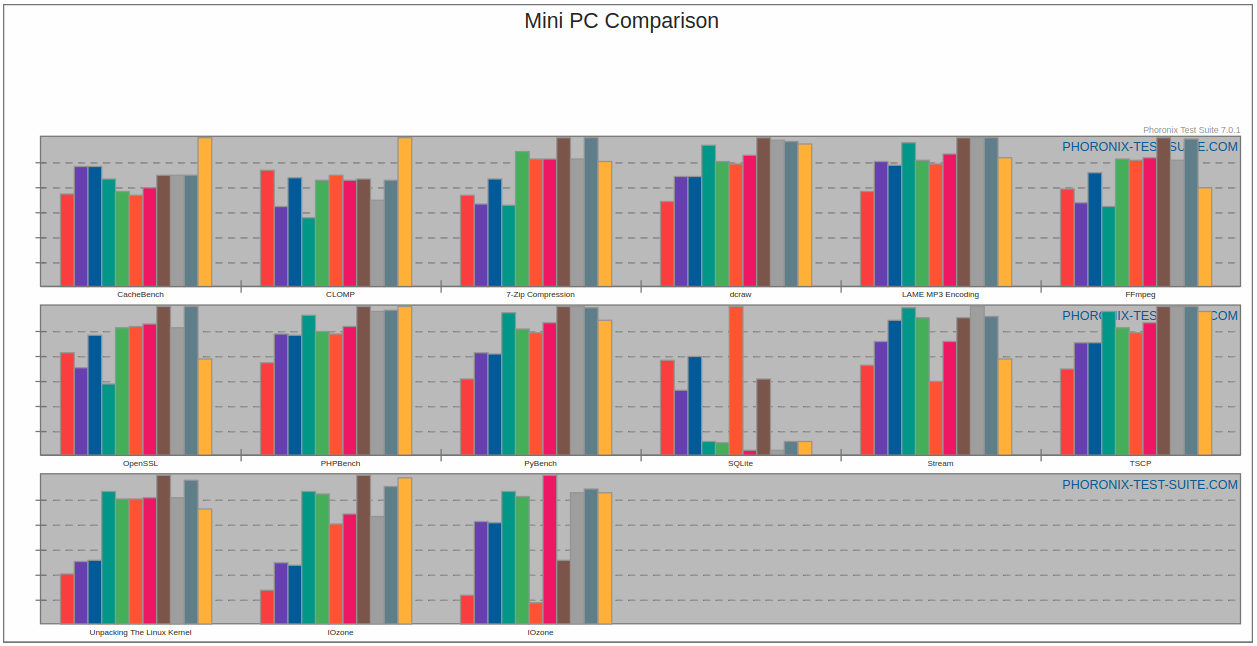
Next I’ve run ‘sbc-bench’ which is a small set of different CPU performance tests focusing on server performance, ‘glmark2’ from the standard repositories which is a benchmark for OpenGL (ES) 2.0, some real-world timing tests for the compilation, zipping and unzipping of the Linux mainline v5.2 kernel, ‘iozone’ also from the standard repositories which is a filesystem benchmark tool and finally ‘Octane 2’ which is a JavaScript benchmark and was run in Chrome.
A summary of the results from each of the above benchmark tests was compared with previously tested mini PCs as follows:
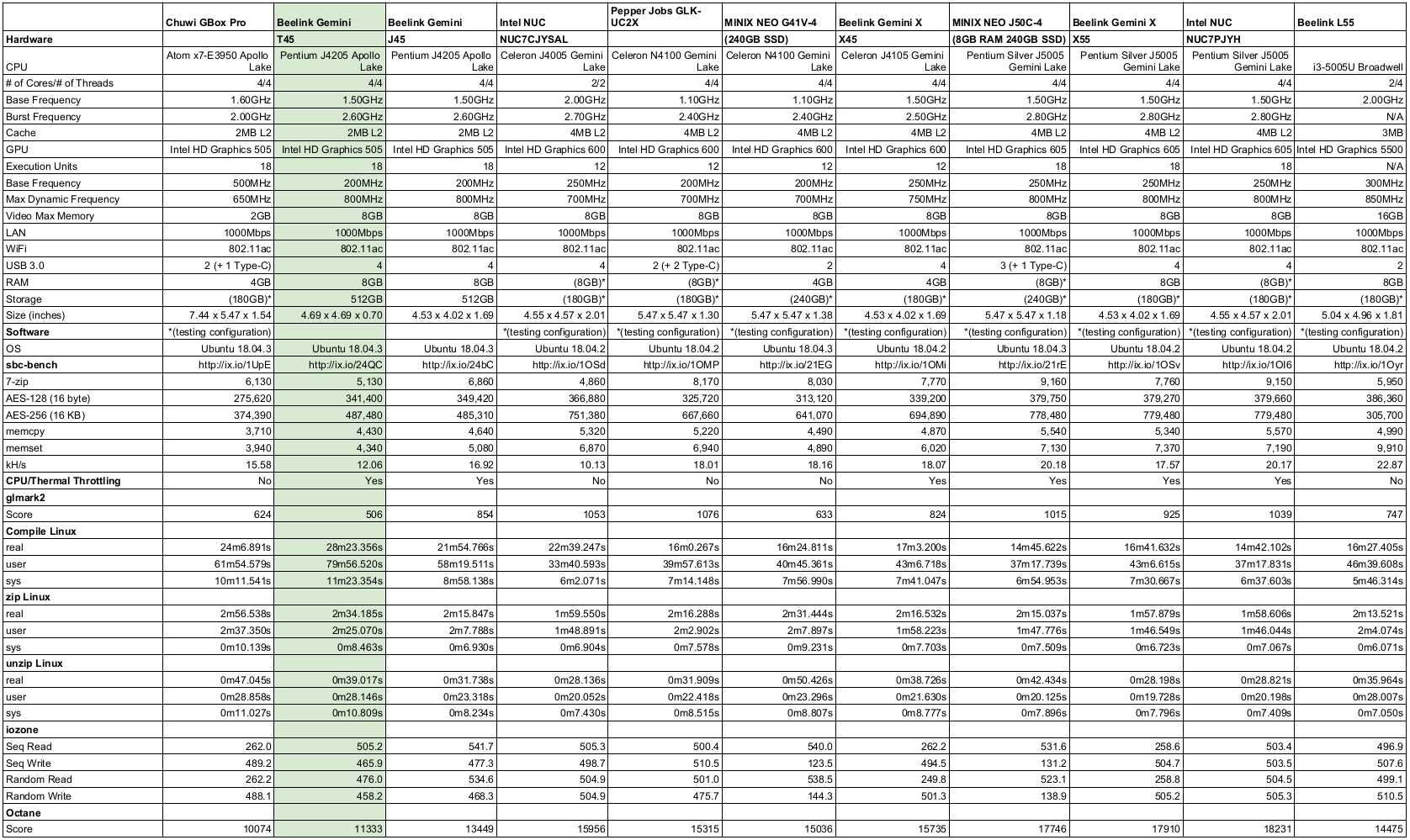
The poor performance for the T45 that was seen in Windows when compared with the J45 can also be seen in the Linux benchmarks.
For a direct comparison with Windows I also tested Geekbench 4:
with the Ubuntu results being slightly better that those for Windows (1579 vs 1538 and 4282 vs 4011).
For real-world testing, I played videos in Edge, Chrome, and Kodi in Windows and in Firefox, Chrome, and Kodi in Ubuntu. The results were slightly worse than with other mini PCs and the following tables summarise the tests and results for each of web browsing, Kodi in general and Kodi playing specific videos:
I also noticed that both Edge and Chrome were slow to launch when using YouTube and felt laggy.
Finally, on both OS I also installed and ran the UNIGINE Heaven benchmark:
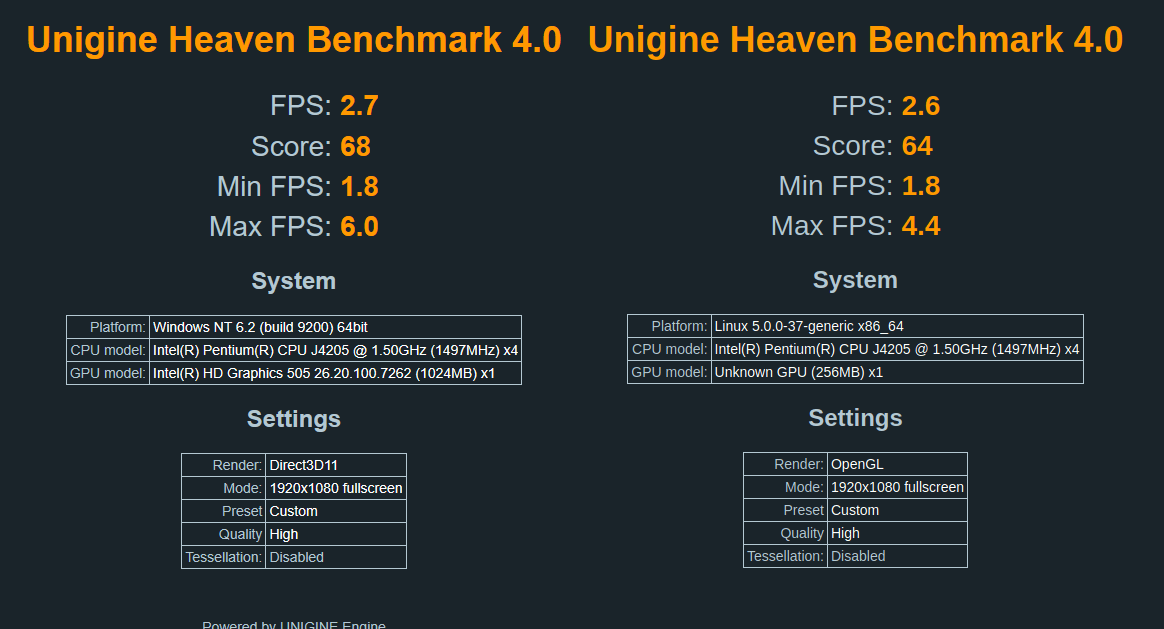
and the results show that the T45 will offer very limited gaming performance.
Network connectivity throughput was measured on Ubuntu using ‘iperf’:
Power consumption was measured as follows and is slightly higher than comparable mini PCs:
- Powered off – 0.7 Watts
- Shutdown – 0.7 Watts (Windows)
- BIOS* – 11.8 Watts
- Boot menu – 11.3 Watts
- Idle – 11.5 Watts (Windows) and 9.1 Watts (Ubuntu)
- CPU stressed – 17.3 Watts (Ubuntu)
- Video playback** – 18.6 Watts (4K in Windows) and 17.6 Watts (1080p in Ubuntu)
* BIOS (see below)
** The power figures fluctuate so the value is the average of the median high and median low power readings.
Finally, the BIOS settings are partly visible and unlocked and a brief overview is available in the following video:
As previously mentioned the T45 is a fanless device relying solely on passive heat dissipation. It uses a massive heatsink that covers nearly the entire board:
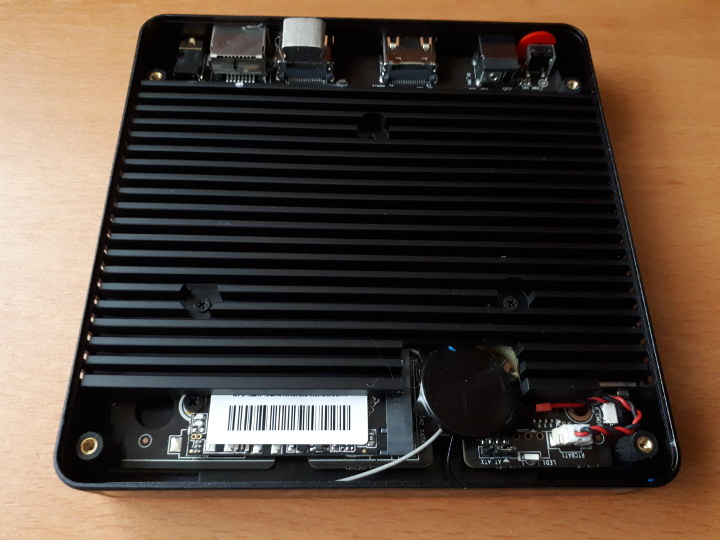
Note that this heatsink also covers the M.2 SSD drive meaning that it will need to be removed and thermal paste reapplied if accessing the M.2 SSD for any reason.
There is little to no airflow possible over the heatsink so it, in turn, relies on the all-metal case to further dissipate the heat.
Whilst there is a warning on the underside of the case:
it does get hot. During benchmarking the maximum temperature I recorded on the top of the device was 53.5°C:
making the device unpleasant to handle when holding it to insert/remove USBs etc..
However, the cooling does seem to work as the maximum CPU core temperature recorded during testing was 68°C:
despite the fact that the ambient room temperature was 30.0°C as it was a hot day with the outside temperature reaching 42°C (107.6°F).
Under Ubuntu, I ran a VP9 video in Kodi for 20 minutes and the internal temperature whilst it climbed during the playback remained manageable and reached a peak of 65°C given the ambient room temperature had now cooled to 24.8°C and the device’s surface temperature was measured at 49.0°C:
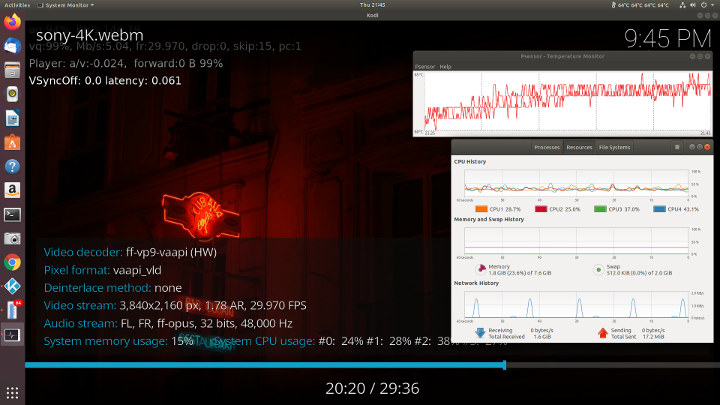
(note the 15 skipped frames occurred when opening and taking the screenshot)
Because of the relatively poor performance when compared to the J45 I looked more closely at the BIOS. Under CPU Power Management Configuration for the T45 the ‘Max Package C State’ is set to ‘C0’ and ‘Power Limit 1 Power’ is set at 6 watts:
which can also be confirmed by HWiNFO:
This can be compared with the settings in the J45’s BIOS:
where the ‘Max Package C State’ is set to ‘PC2’ and ‘Power Limit 1 Power’ is set at 10 watts.
I decided to try just setting the T45’s ‘Power Limit 1 Power’ to 10 watts:
Performance immediately improved in the sample subset of benchmarks I ran:
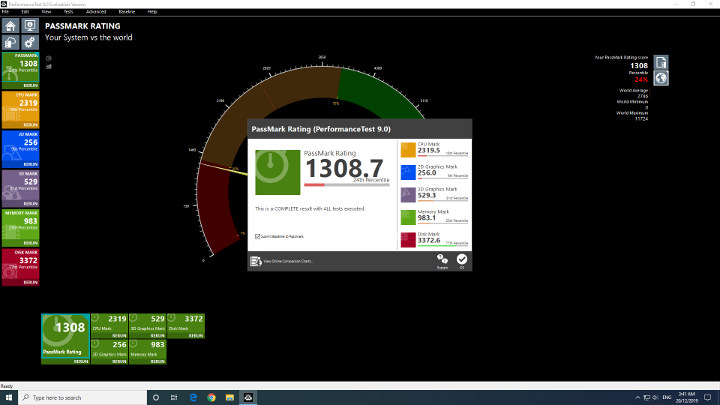
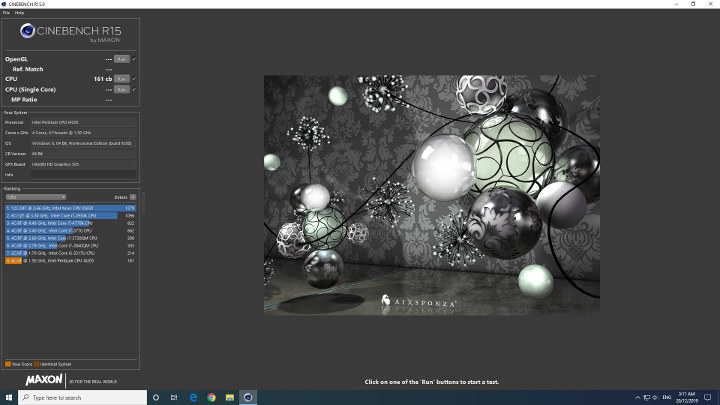
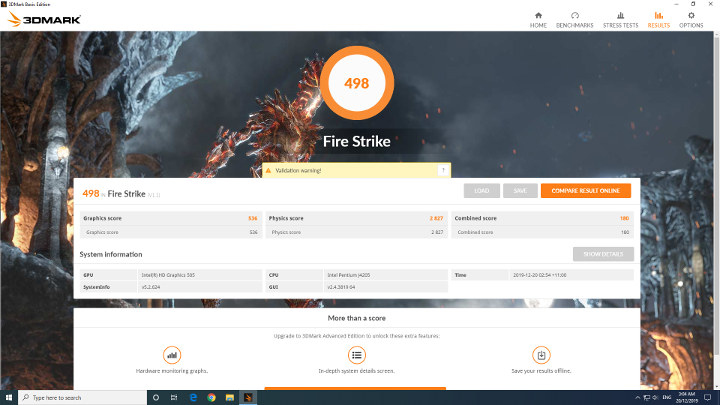
with Passmark improving from 1000.2 (CPU mark of 1808.7) to 1308.7 (CPU mark of 2319.5), Cinebench R15 from 118 cb to 161 cb and Fire Strike improving from 296 to 498.
I also re-ran Octane which improved from 11951 to 12413 and Geekbench 4 where the single-core score stayed the same at 1538 but the multi-core score went from 4011 to 4648:
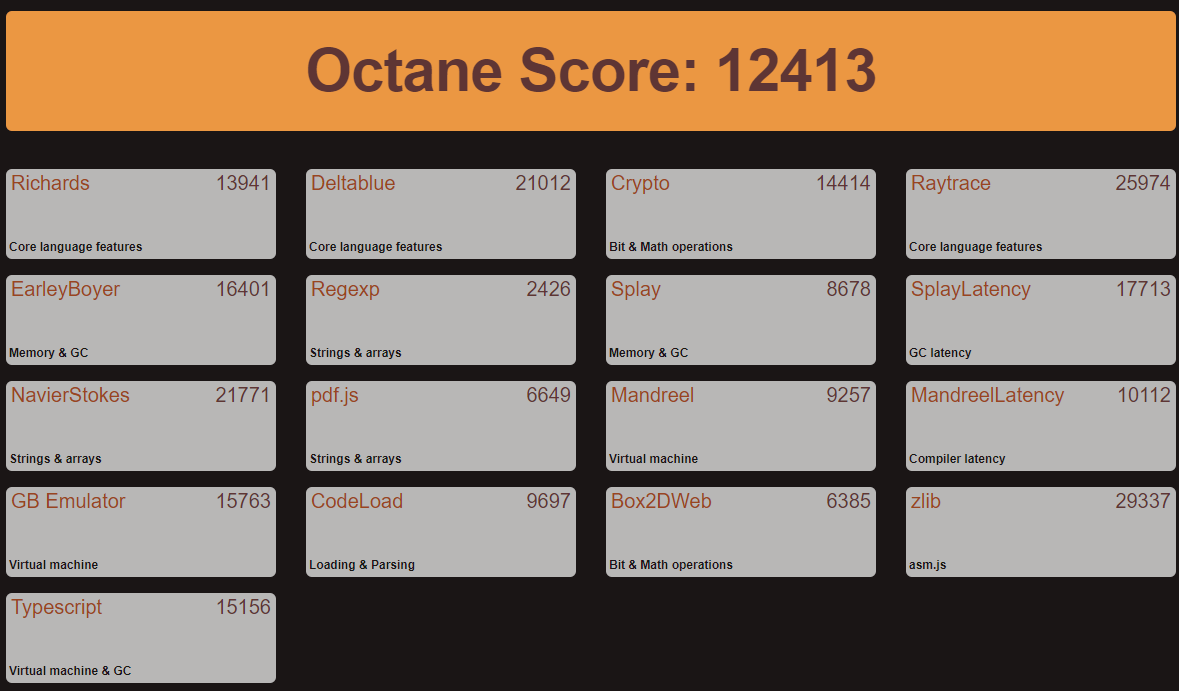
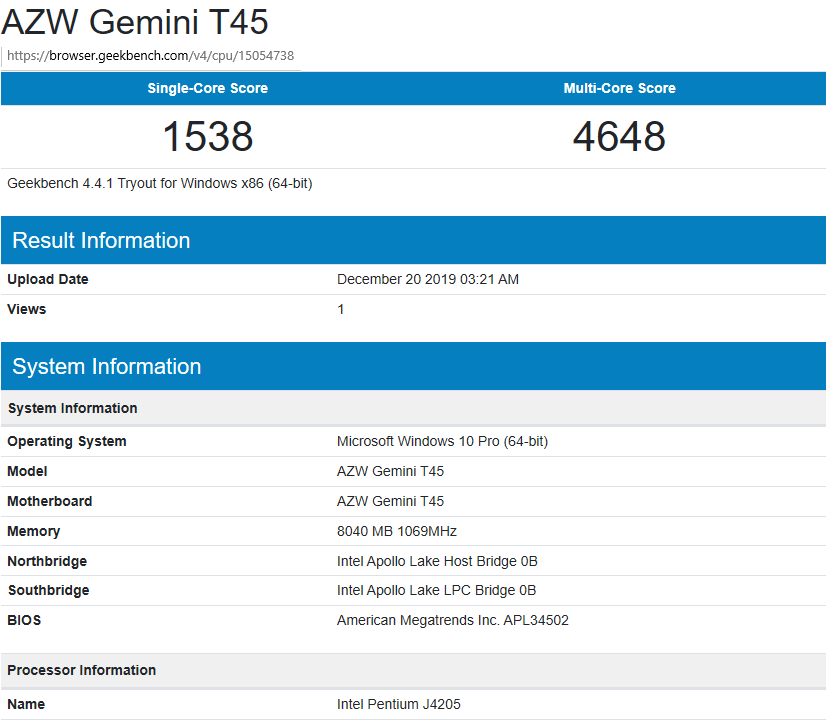
These improvements were also seen in real-world testing. A video that played but skipped occasionally in Kodi on Windows:

now played perfectly:

Interestingly there was no observable thermal implication as the device’s external temperature and internal temperatures remained similar to those seen previously. The maximum CPU core temperature for this short duration of testing was measured at 64°C:
whilst the ambient room temperature was 25.4°C and the device’s surface temperature was 49.8°C.
As a final check I also looked at the effect of changing the power limit whilst running Ubuntu.
Octane improved from 11333 to 13397 and the Geekbench 4 single-core score improved slightly from 1579 to 1596 with the multi-core score going from 4282 to 5020:
Compiling the Linux kernel improved by over 20% from
|
1 2 3 |
real 28m23.356s user 79m56.520s sys 11m23.354s |
to
|
1 2 3 |
real 22m22.993s user 59m55.605s sys 9m15.328s |
A video in Kodi that skipped continuously, dropped out occasionally and whose audio was out of sync with the image:

now played relatively fine with just the occasional frame skip:

And a Youtube video in Firefox that was unwatchable in 1440p@30fps resolution now played fine without stalling or dropping frames:

However whilst changing the power limit has improved the performance and makes the T45 comparable with the J45, the full extent of the thermal implications hasn’t been fully evaluated. Therefore although it is possible to mimic the performance of the J45, and certainly for a limited period, it may not be advisable to make the change permanent without constant monitoring. Either way, the device’s external case becomes hot when under load and whilst that may be a good thing for those enjoying a snowy winter it may be a deciding factor when considering its purchase.
I’d like to thank Beelink for providing the T45 for review. It currently retails at around $240 for the tested configuration from the various mini PC resellers on Amazon, GearBest, Aliexpress, or GeekBuying among others.

Ian is interested in mini PCs and helps with reviews of mini PCs running Windows, Ubuntu and other Linux operating systems. You can follow him on Facebook or Twitter.
Support CNX Software! Donate via cryptocurrencies, become a Patron on Patreon, or purchase goods on Amazon or Aliexpress


